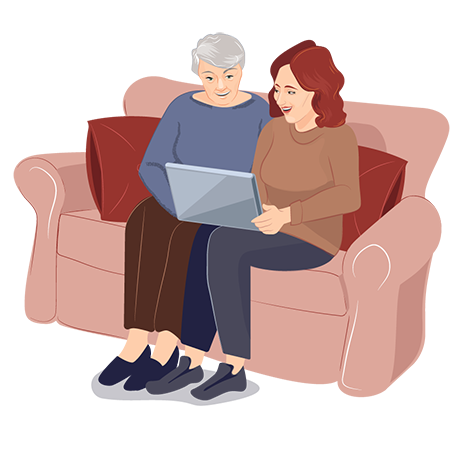
A Guide to Personal Care
Personal care is a type of care that you might need from a live-in carer. Before you decide to opt for personal care services, find out more in our guide which covers everything you need to know.



Speak to one of our experts
Our friendly experts are here to help from 9am to 7pm, 7 days a week.
This guide will cover:
- What is personal care?
- What does a personal care assistant care do?
- What are the benefits of personal care?
- Personal care for Dementia patients
- Personal care for clients with mobility conditions
- Equipment and personal care
- The benefits of personal care for other family members
What is personal care?
Personal care is the type of care that refers to any personal needs. This could include assistance with bathing, changing, getting ready for the day, grooming, shopping, and menial tasks. It can also refer to helping people stay in touch with their loved ones and keeping appointments. For clients who have never had any form of care before, it can be quite difficult for them to come to terms with the fact that they are no longer able to manage personal care tasks themselves. Initially, they may feel embarrassed and refuse the idea of having someone coming to help them with such private functions. For those reluctant to accept assistance with personal care, live-in care is a great option as it enables the client to build up a trusting relationship with one carer who will get to know their client’s preferences and will provide support in accordance with this. However, for those who think personal care is the right choice for them, we touch on more details below.
To understand more about the different types of care, read our care guide.
What does a personal care assistant do?
A personal care assistant will work with you to ensure independence as long as possible. Personal care tasks are considered, as well as helping hands should you or your loved one’s condition deteriorates. Full support can be offered as and when required.
What are the benefits of personal care?
Personal care services are often a popular choice for those who suffer with dementia. Additionally, younger individuals who have mobility conditions that may require physical support often use personal care services. This is because a personal carer can assist with menial day to day tasks that can be difficult to carry out alone. The nature of these tasks naturally take on a more personal approach, and may, for example, involve assistance with mobility, bathing, and showering, helping with preparation to get into bed, and to help with dressing, for example. It may involve assistance with creams, makeup, and grooming, hair care, eye care or foot care. Additionally, catheter care falls within the duties of a personal carer. Assistance with toilet or commode facilities is another way in which a personal carer may help.
Personal Care for Dementia Clients
Personal care for clients with dementia can vary depending on their capabilities. Dementia can add challenges, but our careers are trained in dealing with and adapting to them. They are able to offer a professional yet compassionate service that benefits both the patient and the family. Our carers often find that support needs change if their client deteriorates, and will adjust to their needs. Verbal prompting is often enough to help a client suffering with dementia to be able to carry out his or her own personal care tasks such as combing hair or dressing. It is the aim of a carer to ensure that sense of independence is maintained for as long as possible and do not want clients to lose these vital skills.
Personal care for clients with mobility conditions 
Clients with mobility conditions can benefit from a joint approach, and it may require working together to come up with a plan for personal care. It is important that a carer respects the client’s right to choose how their personal care should be delivered. Some clients will request that their live in carer performs tasks in a certain manner or order or uses certain products for personal care.
Equipment and Personal Care
When seeking out a live in care service, aim to ensure that the live in carers you choose will all have undertaken training as part of their induction into providing care services. Some live in care companies may be more selective than others about the carers they work with. It may be beneficial to seek out a carer who has worked in hospitals, care homes and hospices, where a variety of equipment is used. As people are increasingly opting to live at home while they receive this support, it is often vital that they have a carer who can advise and suggest equipment in order to make the client more comfortable during the delivery of personal care. A live in carer will also discuss the possibility of accessing appropriate equipment, such as hoists, grab rails, slide sheets and bath seats/aids. This may involve discussion with an occupational therapist.
The benefits of personal care for other family members
Family members often turn to the services of personal care when they reach crisis point and they find themselves having to assist their loved one with personal care needs. This can, understandably, cause stress and take its toll emotionally. It is hard to suddenly find oneself supporting one’s parent with intimate tasks when these have always been managed independently in the past. We have often received feedback that the introduction of a live-in carer who will take over these tasks enables families to get back their relationship. For those looking for additional support with a parent, personal care can be a great choice, as you no longer have to worry about supporting mum or dad with menial, day to day tasks. This could include tasks such as having a shower, and a personal carer can give your loved one additional independence and help retain their dignity. Live-in carers should work to be discreet in their support, so that the client and family can spend their time together enjoying each other’s company.
How we can help
We know that if our clients could choose to, they would be managing their own personal care needs. That is why it is very important to us that our clients are matched with a live-in carer that they have selected as someone they feel safe and connected with. We will take the time to speak to our clients and their representatives to ensure we have a full understanding of the kind of person that they are looking for. We will ask appropriate questions and be led by what our clients tell us, so that we can help to select a carer who we feel will put our clients at ease. You may want to discover more about our live-in care services. For more information about how we work, and to start a conversation with one of our friendly care team, call 0118 449 2373, or email hello@theliveincarecompany.co.uk today.






